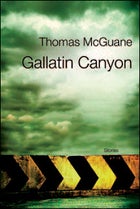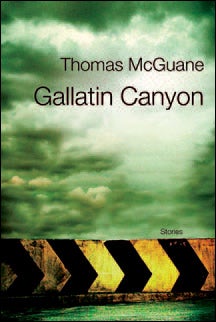THROUGH A CAREER spanning four decades, nine novels, and three works of nonfiction, Thomas McGuane has demonstrated literary virtuosity, a brilliant eye for the natural world, and an almost universal knowledge of outdoor skillsfrom handling a fly rod to reining a runaway horse. Gallatin Canyon (Knopf, $24), his first collection of short fiction since 1986’s To Skin a Cat, is classic McGuane, packed with emotionally wayward characters following dark, twisted paths where chance occurrences, strange coincidences, and surprising bursts of humor wait in dark corners with clenched fists. Although the bulk of Gallatin Canyon is set in McGuane’s home state of Montanathe book takes its name from the fabled river gorge south of Bozeman, a death trap of blind, icy curvesthe writing never lapses into clichéd western fantasy. Instead, when McGuane’s male characters adhere too tightly to
Coming Soon
Hollywood is dusting off two literary classics: Catherine Hardwicke (Lords of Dogtown) will direct a big-screen version of Edward Abbey’s The Monkey Wrench Gang, and Sam Raimi (Spider-Man) will update Jules Verne’s 20,000 Leagues Under the Sea. Meanwhile, surfing gets silly with Big Wave, a comedy from Dodgeball producer Ben Stiller and directors Emmett (Thicker Than Water) and Brendan Malloy. No word yet on release dates.Gallatin Canyon

Strange Trips
On the road or at sea, it's all about the journey
CROSS COUNTRY
By Robert Sullivan
(Bloomsbury, $25)
HAVING DRIVEN ACROSS America 27 times, Robert Sullivanauthor of 2004's natural history Ratsis somewhat of an authority on interstate-iana. Here he packs up his family for a trip from Oregon to New York, determined to explore our mania for long-haul drives. Ditching folksy blue highways for the multilane behemoths he argues are “the real America,” Sullivan uses the long stretches between bathroom stops to hold forth on Lewis and Clark's slog to the Pacific, the road-obsessed Beat poets, and the seventies heyday of the Cannonball Run. While his ruminations on coffee-cup lids and motel breakfast bars can be tedious, his historical detours are engrossing, and his Woody AlleninaChevy neuroses keep things lively. “I see another Impala, or at least I think it's an Impala, but, anyway, it's a cop at the top of the hill,” he notes in the Dakotas. “I slow down and am cool, or think I am cool. God, I think, please let me be cool!” A lot of the time, Sullivan, you are.
Jason Daley
SEA WORTHY
Adrift with William Willis in the Golden Age of Rafting
By T. R. Pearson
(Crown, $25)
WHEN THOR HEYERDAHL and his five crewmates crossed the Pacific in the balsa-wood raft Kon-Tiki, in 1947, they entered the pantheon of great explorers. When 61-year-old William Willis repeated the voyage, solo, seven years later, his name became a footnote in the annals of sailing miscellany. Now, in the strange-but-true history Seaworthy, Virginia- based novelist T. R. Pearson gives the fearless New York merchant seaman his due. Falling somewhere between intrepid soloist and full-on nutcase, Willis survived on raw fish, olive oil, and a daily cup of ocean water as he rafted across the Pacific twice (and attempted the Atlantic three times), periodically hanging upside down from ropes to relieve a nagging hernia. “Willis was essentially an extreme sportsman well in advance of the phenomenon,” Pearson writes. “In the context of his era, he made for a gaudy curiosity, a sort of accomplished crackpot.” By turns inspiring and hilarious, Seaworthy is an entertaining ride along the thin line that separates boldness from folly.
Bruce Barcott



